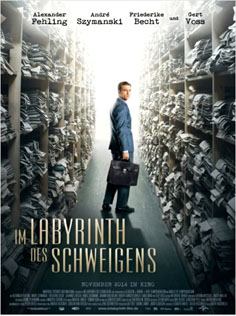
Germany 2014
Starts November 6, 2014
Directed by: Giulio Ricciarelli
Writing credits: Elisabeth Bartel, Giulio Ricciarelli
Cast: Alexander Fehling, André Szymanski, Friederike Becht, Johannes Kirsch, Gert Voss
Length: 123 minutes In Labyrinth of Lies (a German language film), the director Giolio Ricciarelli successfully portraits the repression, guilt and shame of war crimes in the time of the Wirtschaftswunder (economic boom) of post World War II Germany. It’s the time when silence surrounds the atrocities and the Holocaust—the survivors are traumatized, the war criminals are in disguise, the former Nazi followers want to forget and the young generation is not informed. This film centers on the courageous fight of a few to break the silence.
In Labyrinth of Lies (a German language film), the director Giolio Ricciarelli successfully portraits the repression, guilt and shame of war crimes in the time of the Wirtschaftswunder (economic boom) of post World War II Germany. It’s the time when silence surrounds the atrocities and the Holocaust—the survivors are traumatized, the war criminals are in disguise, the former Nazi followers want to forget and the young generation is not informed. This film centers on the courageous fight of a few to break the silence.
In 1958 in Frankfurt am Main, the young prosecutor Johann Radmann (Fehling) and the journalist Thomas Gnielka (Szymanski) incidentally find in the belongings of a Holocaust survivor (Kirsch) an official document that gives the details of shootings of prisoners by the SS-guards at Auschwitz. They show this document to the Attorney General of the state of Hesse, Fritz Bauer (Voss). At this point all war crimes except murder are time-barred, but Bauer has long wanted the Germans to confront their past from the view of the victims and to obtain the verdict that there was a humanistic obligation to say no to Nazi terror and that “nobody had the right to obey”. Bauer immediately realizes that this is the documentation he needs to initiate a trial of the offenders and assigns Radmann to head the investigation, warning him that there is a labyrinth and not to get lost. Radmann dedicates himself to finding out what happened at Auschwitz but along the way he does get lost—losing his sense of right and wrong, forgetting his beautiful girlfriend Marlene (Becht), and alienating friends and colleagues. But in the end he prevails and history is written.
The psychological drama of the young prosecutor is fictional but it is developed in view of the historical events and figures (Fritz Bauer and Thomas Gnielke among others). Radmann is the fictionalized composite of the three prosecutors who were assigned by Bauer to the Auschwitz trial. The scriptwriters consulted the historian Werner Renz of the Fritz Bauer Institute in Frankfurt for the description of the historical events, which are said to be as “correct and precise as possible”. The script is strong, shows the moral issues from different sides but is marred by a side plot. The cinematography expertly documents the late 50s and early 60s; and when possible, the filming took place in the original theaters in Frankfurt (Römer, Bolongaro Palace, IG Farben Building). The whole ensemble stands out; in particular, the leading actor Alexander Fehling lends great credibility to his central role and Gert Voss gives a grand performance in his last role. Labyrinth of Lies is an impressive combination of drama, history, and good entertainment. ()
